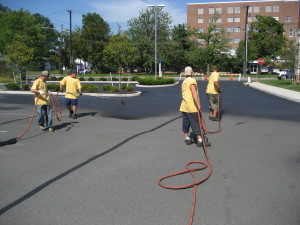Will sealer make the pavement slippery? How do we prevent this?
Will sealer make the pavement slippery? How do we prevent this?
 There are two scenarios in which sealer will make asphalt pavement slippery.
There are two scenarios in which sealer will make asphalt pavement slippery.
1. When sealant is first applied, it will be slippery until it has dried. However, since there should be no traffic on the pavement while the sealant is wet, this is pretty much a non-issue.
2. If the asphalt contractor does not mix the sealant properly, it may make the pavement slippery even after the sealant has cured. This can be a major problem for you, exposing you to potential lawsuits should anyone be injured on your property. In addition, the sealcoating will not reach its full life expectancy, leaving you to have the job repeated prematurely.
There are two scenarios in which asphalt sealer will make asphalt pavement slippery.
1. When sealant is first applied, it will be slippery until it has dried. However, since there should be no traffic on the pavement while the sealant is wet, this is pretty much a non-issue.
2. If the contractor does not mix the sealant properly, it may make the pavement slippery even after the sealant has cured. This can be a major problem for you, exposing you to potential lawsuits should anyone be injured on your property. In addition, the sealcoating will not reach its full life expectancy, leaving you to have the job repeated prematurely.
Adding silica sand to the sealant mix is extremely important. It improves traction, helping to prevent skids and slips. It also:
• Reduces glare
• Helps camouflage minor imperfections to improve pavement appearance
• Protects the integrity of the sealant
Sealant that is mixed with more water than the manufacturer recommends cannot hold as much solid content, such as sand. (It can also be too thin to provide adequate protection.) Without the correct amount of solids, the sealant will wear quickly — and it will be more slippery. As a general rule, the less sand in the sealant, the slicker the surface will be, but contractors must be sure to keep the amount of sand within the ranges specified by the manufacturer for each particular sealant. If additional traction is needed, such as for a driveway located on a steep incline, the contractor can broadcast silica sand over the top of the freshly applied sealant rather than include it in the mix.
Because not all asphalt contractors make the effort to follow manufacturers’ instructions for mixing sealants, it is important that you ask about the sand content beforehand. Dirtworks offers a full line of Site Work including asphalt sealcoating, snow removal, paving and grading, and cellar holes. We are also fully licensed and insured for demolition. For more information call (508) 240-5541 or ask for a free quotation!
MCE Dirtworks is Cape Cod Asphalt Paving Expert!






